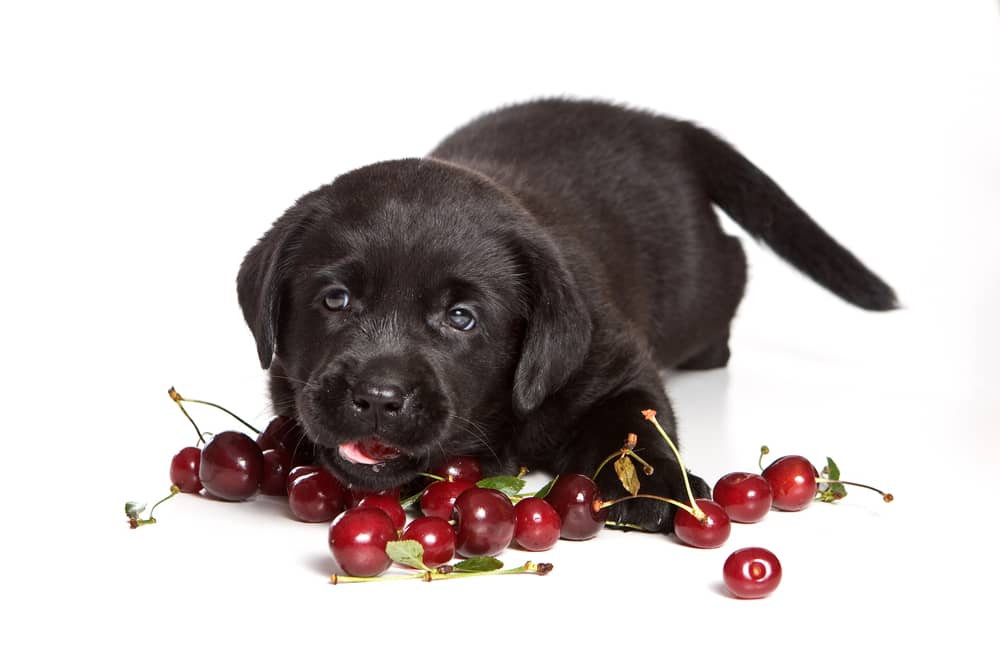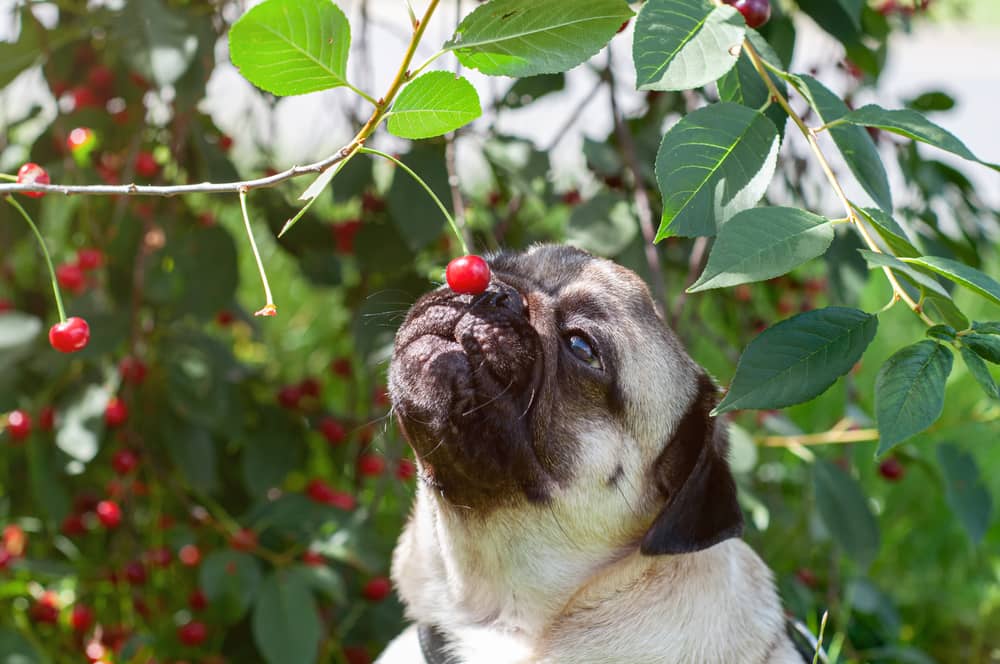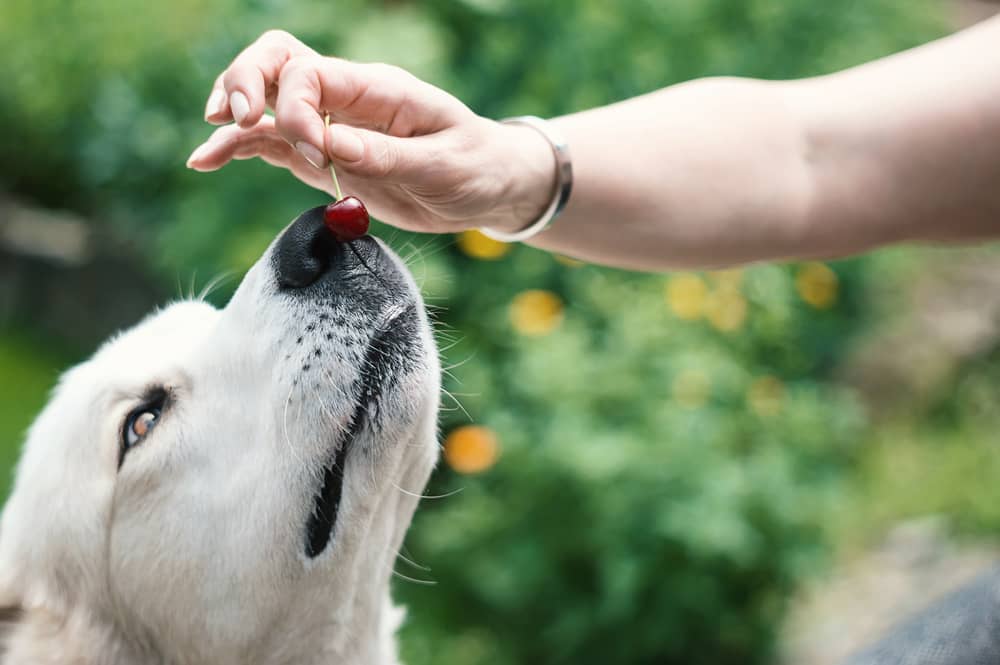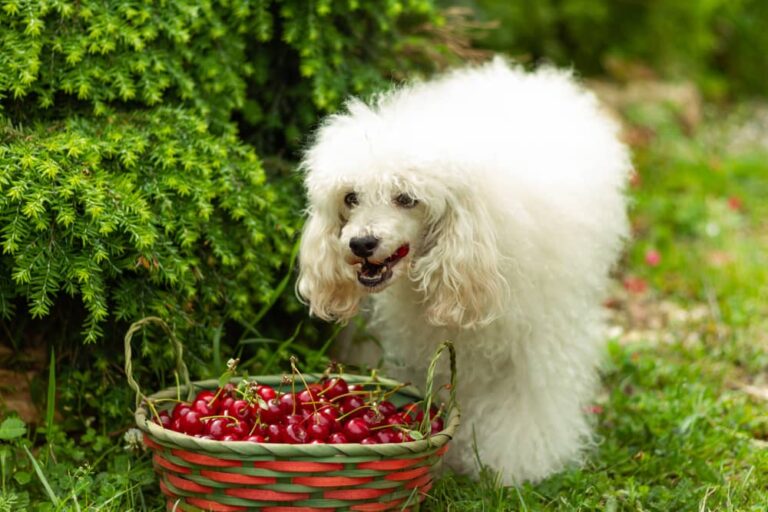Can Dogs have Cherry Juice? – Ultimate Guide
Introduction
A common fruit that many of us like as a snack or as a component in different cuisines is cherries. But what about our pet dogs? Can Dogs have Cherry Juice? Cherries can be a tasty and healthy treat for dogs, but if they are not served correctly, they can also bring some risks.
Everything you need to know about cherries for dogs will be covered in this article, including their potential health advantages, potential risks, common myths and misconceptions, alternate fruits and vegetables, and advice on how to safely feed cherries to your pet.

Read on for a comprehensive tutorial on this juicy subject, whether you’re a dog owner trying to give your pet a nutritious treat or are simply wondering about the connection between dogs and cherries.
Can Dogs have Cherry Juice?
Sure, dogs can eat cherries, but there are a few important aspects. The cherry’s flesh is safe for dogs to consume, but the cherry plant’s stems, leaves, and pits contain cyanide, which can be poisonous to dogs in large doses. Dogs who consume cherry pits run the risk of choking or developing digestive blockages.
Always remove the pits and stems from cherries before giving them to your dog, and only give tiny amounts at once. When giving cherries to your dog, it’s important to watch for any symptoms of digestive distress or other unfavourable reactions.
Together with these safety measures, it’s important to keep in mind that while cherries can be a delightful and healthy treat for some dogs, they might not be suited for all dogs. Due to cherries’ sugar and potassium content, dogs who suffer from certain medical disorders, such as diabetes or kidney disease, may need to avoid eating them. Before adding new items to your dog’s diet, it’s always a good idea to consult your veterinarian.
Also Read: 19 Manly Dog Breeds for Guys
Health benefits of Cherry Juice for dogs
Cherries are a fantastic source of antioxidants, vitamins, and minerals which can have several positive effects on the health of dogs. The following are some of the main advantages of cherries for dogs’ health:

● Inflammatory-reducing qualities
High quantities of antioxidants, such as quercetin and anthocyanins, which have been shown to have anti-inflammatory properties, can be found in cherries. This indicates that they can help in lowering inflammatory levels in the body, which is advantageous for dogs who suffer from diseases like allergies or rheumatoid arthritis.
● Heart health improvement
Potassium, which is essential for heart health, can be found in cherries. Potassium can lower the risk of heart disease in dogs, support healthy heart muscle function, and help control blood pressure. Cherries are a great treat choice for dogs who need to maintain a healthy weight because they are low in fat and calories.
● Enhanced immunity
Vitamin C is one of the antioxidants found in cherries, which can enhance a dog’s immune system. Injurious free radicals, which can destroy cells and have a role in disease, are combated by antioxidants in the body. Your dog’s health and happiness can be preserved by a strong immune system, which can help prevent infections and illnesses.
● Enhanced digestion
Dietary fibre, which is abundant in cherries, can help to enhance a dog’s digestion. The risk of constipation and other digestive problems can be decreased by fibre, which helps in regulating bowel motions. Cherry juice also contains polyphenols, which have been demonstrated to have beneficial effects on the gut, promoting the development of good gut bacteria.
● Reduced risk of cancer
According to certain research, cherries’ antioxidant component can help lower dogs’ chance of developing cancer. Particularly, it has been discovered that anthocyanins have anti-cancer characteristics and may help in stopping the growth and spread of cancer cells. Cherries can give some cancer prevention for your dog, but more research is required in this area.
While cherries have some possible health advantages to dogs, it’s essential to keep in mind that they should still be served in moderation and as part of a balanced diet. However, not all dogs may react favourably to cherries; some might experience stomach problems or other negative effects. It’s always a good idea to speak with your veterinarian before introducing cherries to your dog’s diet.

Potential risks of cherries for dogs
The sweet and tart flavour of cherries makes them a widely consumed fruit, and they are frequently used as an ingredient in a variety of dishes and beverages. Cherries could be good for people’s health because they are a good source of antioxidants and vitamin C, yet they could be harmful to dogs. Dogs who eat cherries can face the following risks:
● Choking Risk
Cherries have a smooth, hard pit that can suffocate dogs, particularly little dogs or dogs that tend to swallow their food. The intestinal obstruction that might result from eating the pit can be a dangerous and even fatal illness.
● Cyanide Intoxication
Cherry pits contain cyanide, which is poisonous to both dogs and people. Although there is only a small quantity of cyanide in a single cherry pit, if a dog eats multiple pits, it can cause cyanide poisoning. Dog cyanide poisoning can cause dilated pupils, breathing problems, vomiting, diarrhoea, and in severe cases, even death.
● Uneasy Stomach
Cherries can still give dogs an upset stomach, diarrhoea, and vomiting even if they don’t consume the pits. This is due to cherries’ high sugar and fibre content, which can be difficult for dogs to digest.
● Responses to Allergens
Much like humans, dogs can have cherry allergies. Itching, hives, swelling, and breathing difficulties are signs of a cherry allergy in dogs.
● Diabetes
Cherries contain a lot of sugar, which could be problematic for dogs who have diabetes. If a diabetic dog consumes cherries, its blood sugar levels may jump, which may result in several health issues.
Cherries can appear to be a risk-free food for dogs, but they can provide several possible dangers. Strawberries, blueberries, and watermelon are just a few of the healthier fruit options you can offer your dog as a treat. Always seek advice from your vet before introducing any new foods or treats to your dog.
Also Read: Pitbull Muscle Gaining Tips
Common myths and misconceptions about cherries for dogs

Misconception 1: Dogs can acquire a lot of vitamins and minerals from cherries.
Cherries are not important for a dog’s diet, even though they can be an excellent source of vitamins and minerals for people. Dogs can obtain all the nutrients they require from their regular diet, therefore offering them cherries could prove detrimental given the previously listed risks.
Misconception 2: Dogs are only at risk from cherry pits.
While cherry pits do pose a serious risk to dogs, the fruit itself can also be dangerous. As was previously noted, cherries can upset a dog’s stomach, induce diarrhoea, and even cause allergic responses.
Misconception 3: Only specific varieties of cherries are harmful to dogs.
Dogs who eat the pits or consume an excessive amount of cherries, particularly sweet and sour varieties, could become ill. Different cherry varieties have variable levels of toxicity, however, these differences are not very noticeable.
Misconception 4: Giving dogs cherry-flavoured treats or food is acceptable.
While cherry flavouring might be acceptable for dogs, it’s important to keep in mind that it might not have the same nutritional advantages as actual cherries. In addition, a lot of candies and gum with cherry flavour contain xylitol, which is particularly hazardous to dogs.
Misconception 5: Dogs can easily digest cherry pits.
It is never a good idea to assume that all dogs can easily pass cherry pits, even though some dogs might be able to. Choking, intestinal blockage and potentially fatal cyanide poisoning can result from eating cherry pits.
In light of the potential risks, it is important to avoid feeding cherries to dogs. If you have any questions about your dog’s diet, talk to a veterinarian and stick to safe, healthful treats designed exclusively for dogs.
Also Read: Can Dogs Eat Bananas?
Alternate fruits and vegetables
Here are some excellent choices if you’re looking for safe and wholesome fruits and veggies to offer your dog as a treat:
● Blueberries
Because they are a good source of antioxidants and have few calories, blueberries are a nutritious treat for dogs.
● Strawberries
In addition to being low in calories, strawberries are also a good source of antioxidants, fibre, and vitamin C.
● Watermelon
Watermelon is low in calories and high in vitamins A and C, making it a fantastic hydrating treat for dogs.
● Apples
Apples are a rich source of fibre and vitamin C; but, before offering them to your dog, make sure the seeds and core have been removed.
● Carrots
Carrots make a fantastic snack for dogs since they are low in calories, high in fibre, and rich in vitamin A.
● The sweet potato
A pleasant and nutritious treat for dogs, sweet potatoes is a wonderful source of fibre, vitamin B6, and beta-carotene.
● The beans
Green beans are a terrific addition to your dog’s diet because they are low in calories and high in fibre and vitamins.
Always remember to moderately feed fruits and vegetables to your dog, and seek advice from your vet before making any dietary modifications.

Also Read: Dental Hygiene for Dogs – Dog Teeth Whitening
Advice on how to safely feed cherries to your pet
Giving cherries to your pet is generally not advised as they can be harmful to their health. Even so, if you still want to give cherries to your pet, follow these guidelines for doing so safely:
● Clean the pits
Before providing cherries to your pet, always remove the pits. The pits contain cyanide, which is harmful to animals and can lead to choking or intestinal obstructions.
● Make little portions of cherry pie.
Before giving cherries to your pet, chop them into little pieces to lower the chance of choking. Also, doing so will make them simpler for your pet to digest.
● Limit the quantity.
Provide cherries as a treat to your pet in proportion. A few cherries now and then should be acceptable, but avoid including cherries in your pet’s diet regularly.
● Look out for any negative effects
After offering your pet cherries, keep an eye on them. Stop giving them cherries and call your veterinarian if they vomit, have diarrhoea, or exhibit any other negative responses.
● Think about substitute treats
As a reward, you can give your pet a variety of different safe and healthy fruits and vegetables, like blueberries, strawberries, and carrots.
Therefore, it’s important to remember that cherries are not a necessary part of your pet’s diet and that there might be dangers related to providing them to your pet. The best course of action is to speak with your vet before introducing any new foods or treats to your pet.
Breeds of dogs and cherry poisoning
All dog breeds should be aware of cherry poisoning, however, some could be more vulnerable than others due to physiological or hereditary causes. The following information concerning canine breeds and cherry toxicity is important to know:

● Small breeds
Due to their smaller size, small dog breeds including Chihuahuas, Yorkshire Terriers, and Pomeranians may be particularly vulnerable to cherry toxicity. A blockage in their digestive system from even a little amount of cherry pits or flesh might result in choking or digestive problems.
● Breeds with brachycephaly
Breeds with shorter noses, including bulldogs, pugs, and boxers, may have trouble swallowing and chewing their food. As a result, cherry pit choking and intestinal obstructions might grow more frequent.
● Breeds for hunting
Hunting breeds with strong scavenging instincts, like Beagles and Retrievers, can be more prone to consume cherries or cherry pits if they come across them. This could make them more vulnerable to cherry poisoning.
● Breeds with a pancreatitis history
Breeds that are more susceptible to pancreatitis, a disorder in which the pancreas becomes inflamed, include Miniature Schnauzers and Yorkshire Terriers. Eating cherries or cherry pits can make this disease worse and cause further health issues.
● Breeds with a kidney disease history
Breeds like Samoyeds and Lhasa Apsos are more susceptible to kidney disease than others. Cherry consumption in excess can harm the kidneys or make them worse if they already have issues.
All dogs, regardless of breed, run the danger of cherry poisoning and should not be given cherries or cherry pits, it is important to remember. If your dog displays symptoms like vomiting, diarrhoea, or trouble breathing after eating cherries or cherry pits, you should take him to the vet right away. To help your dog recover from cherry toxicity, your veterinarian can provide care and support.
Conclusion
In conclusion, cherries can be a delightful and healthy treat for dogs, but it’s important to provide them to them rarely and carefully. Cherries have antioxidants, fibre, and vitamins that can be good for dogs’ health, but they also have pits which, if consumed, might suffocate or create digestive problems. Before providing cherries to dogs as treats, it is advised to remove the pits and stems and to keep the number of cherries to a minimum.
Also, it is best to speak with a veterinarian before adding cherries to a dog’s diet if they have a history of illnesses or allergies. Thus, while cherries can be a safe and healthy addition to a dog’s diet when given in proportion, they must take the right precautions to ensure their safety and well-being.
FAQ’S
Q: What happens if a dog eats cherries?
A: If a dog consumes cherries, the pits may cause digestive blockage, vomiting, diarrhoea, or an upset stomach. A poisonous substance called cyanide is also present in the pits. To reduce the danger of health problems for dogs, it is crucial to remove the pits and serve cherries in proportion.
Q: How many cherries are toxic to dogs?
A: The quantity of cherries that can be poisonous to dogs depends on the size of the dog and the amount of cyanide in the cherry pits. As a general rule, it is advised to keep cherry consumption to a minimum and to remove the pits because they can result in gastrointestinal blockage or cyanide poisoning in dogs. Before adding cherries or any other new food to a dog’s diet, it is best to consult a veterinarian.
Q: Can dogs have maraschino cherries
Maraschino cherries are safe for dogs to eat, however, because of their high sugar content and artificial additives, it is not advised to give them to dogs. Maraschino cherries include sugar and chemicals that might upset a dog’s stomach and perhaps cause obesity and other health problems. It is better to stay away from giving dogs maraschino cherries as a treat and to only give them genuine, fresh cherries on occasion.
Q: Can dogs eat cherry jam?
Dogs shouldn’t be fed cherry jam since it often contains a lot of sugar, preservatives, and other substances that can be harmful to dogs.
Q: Can a dog eat cheery yoghurt?
Cherry yoghurt should be avoided because it frequently contains extra sugar, artificial flavours, and preservatives that can be harmful to dogs, plain yoghurt can be a healthful treat for canines.





